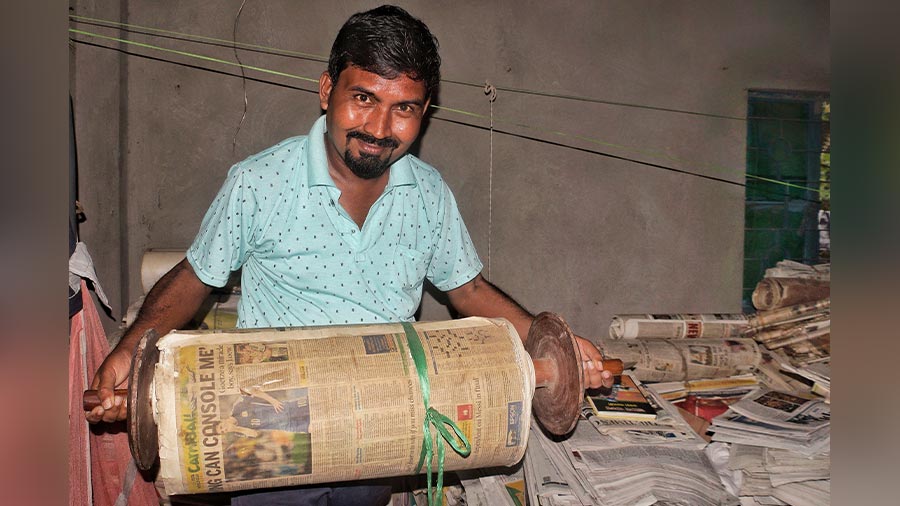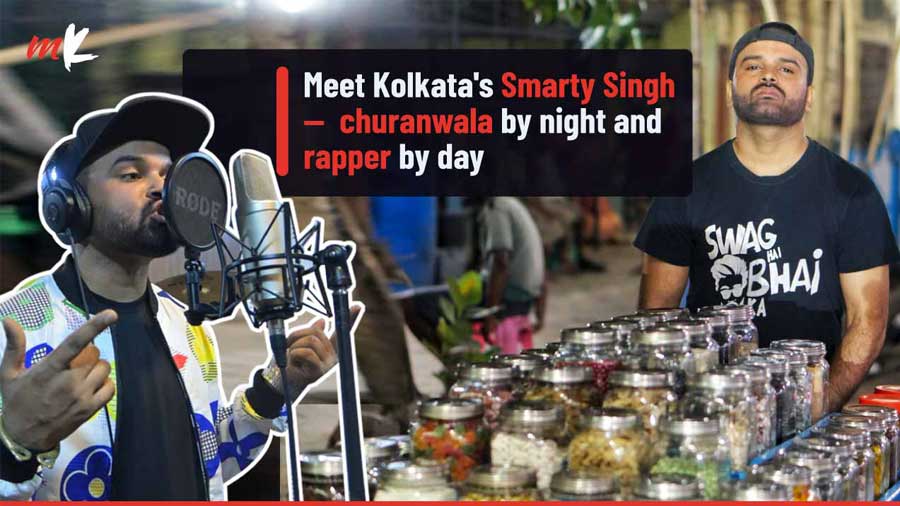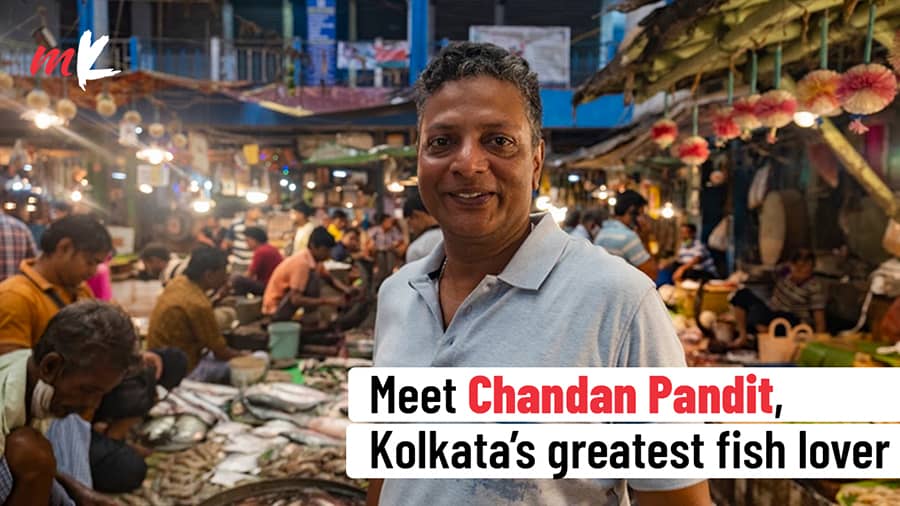Dinanath Paul shares a 10ft-by-12ft room in south Kolkata’s Garia with his mother, Dipika. And most major newspapers of the country.
The first thing people notice when they step inside Dinanath’s home is the newspapers everywhere. Not only are they stacked in shelves, they also take up most of the floor. But Dinanath doesn’t seem perturbed at all. Life without newspapers is pointless to him.
“We get 15 newspapers, in English, Hindi and Bengali, at home every morning,” says the 45-year-old. “I start reading them only in the second half, and continue till 11pm on most days. If there is some important news, I stay up longer, and ask our vendor to bring more newspapers the next day for a diverse perspective,” explains Dinanath. But before the vendor comes the next morning, with an extra bunch of rolled newspapers delivered through the window grille, Dinanath is up and out — with his flask of tea. That’s how the day starts for this tea seller with an unusual passion.
A day in the life of a collector
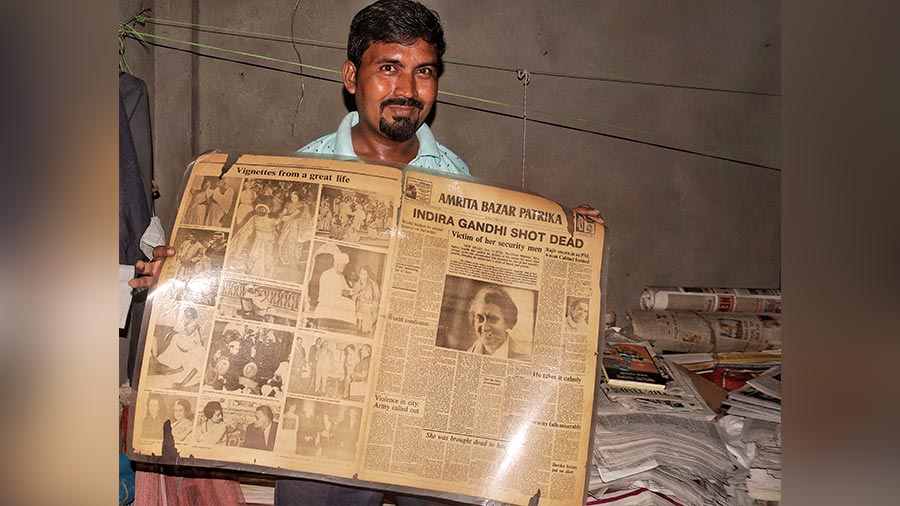
Dinanath hold up one of his prized pieces — a newspaper report of the death of Indira Gandhi
The first thing Dinanath does every morning after getting up is put water on the boil. When the tea is done, he pours it into a large flask and heads towards Garia station, where he sells approximately 150 cups a day, returning home at least three times for a refill. “I often call him Modi da,” chuckles Dipika, a retired schoolteacher who now teaches English and political science to university students at their home.
Dinanath returns home by 3pm and spends some time brushing up on his computer skills. Finding employment has always been difficult. He still hopes to land a better-paying job, though he relishes the freedom of entrepreneurship. At 4.30, he finally attends to his ‘beloved’.
For the past few weeks, the Paul household has been receiving 20 newspapers every day. One reason was the Israel-Hamas war, and, of course, the cricket World Cup. “I have been collecting every news story I can find on the World Cup, irrespective of whether it is about India or any other team. I was incensed at how England won the 2019 final, being awarded six runs first, when a throw deflected off Ben Stokes’s outstretched bat and away to the boundary; followed by the Super Over verdict which was decided on the boundary count. [New Zealand had fewer boundaries.] Even now, thinking about that match enrages me,” Dinanath says. As for more recent news, he has already begun documenting Bishan Singh Bedi’s life, following the legendary cricketer’s passing in October.
Scrolls of love
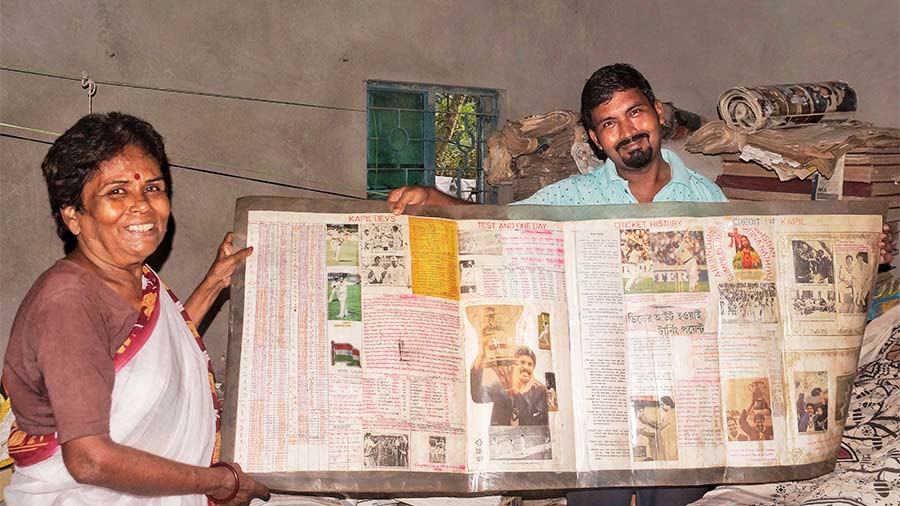
Dipika and Dinanath with his newspaper collection chronicling Kapil Dev's career
The number of newspapers they subscribe to is not the only thing that is remarkable about the Pauls. There is also how Dinanath archives them into ‘scrolls’ — his scrolls of love. He first compiles multiple pages of newspapers based on a particular topic, and then rolls them together into a bundle. He also adds handles, like on the roller of a kite.
Some of Dinanath’s most prized scrolls are based on the cricket World Cup, Lionel Messi, Indira Gandhi and Mamata Banerjee. He is also passionate about collecting newspapers from historic periods, many of which have earned standalone laminations including headlines about India’s Independence, World War II and the assassination of Mahatma Gandhi. “I have copies of both the Delhi and Kolkata editions of The Statesman published on the day India became independent. I also have The Times of India’s front page of that day. I love the way each publication reported the same news with different headlines.”
Dinanath’s collection dates back to 1838, with a headline reporting a fire in Belgrade. Some of the most iconic headlines from his collection include ‘Britain declares war on Germany’, ‘Mahatma Gandhi Assassinated at Delhi’, ‘Indira Gandhi shot dead’, ‘Two Dominions are born’ (alluding to the Partition), ‘Gandhi listens to “Woes of Calcutta”’, ‘Bharat Ratnahin. Biday Satyajit’ [on Satyajit Ray’s passing], and ‘Bimanjuddhe Marshal Balbo Nihoto’ — the death of Italy’s Marshal Balbo in June 1940, weeks after Italy had declared war against France and Great Britain, when the plane he was travelling in as a passenger was shot down by Italian anti-aircraft guns in a case of mistaken identity.
‘No less than Louvre’
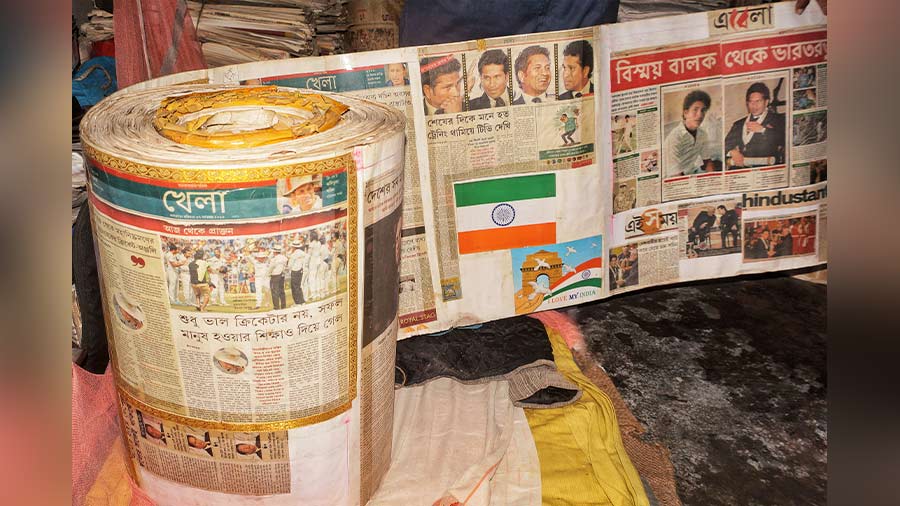
Dinanath’s biggest dream is to meet Sachin Tendulkar, and show him the 350-foot-long newspaper scroll he has on cricketing legend, with clippings of his news stories dating back to 1989
Dinanath looks excited when he talks about each of his newspapers, effortlessly recounting facts from every story. To him, his collection is no less than the Louvre, and he, a well-informed guide. But his eyes light up the brightest when he approaches his ‘Mona Lisa’. A scroll sits at the centre of the room, reserved for the man he calls his ‘biggest God’.
“My only dream is to meet Sachin Tendulkar and present him with this scroll. It documents his entire life and career, starting from 1989 [the year the Master Blaster made his Test and ODI debut]. I even requested Didi [chief minister Mamata Banerjee], when she had come to inaugurate the Durga Puja at Naktala Udayan Sangha in 2016, but nothing has come to fruition yet,” he sighs. The scroll on Tendulkar spans over 350 feet, and continues to grow every time Dinanath finds a story about the legend.
But how did this passion for collecting newspapers come about? Over then to Dipika, a tough elderly lady who brought up her two children, a son and a daughter, after her husband died early when Dinanath was a kid. Dinanath’s sister lives nearby with her daughter.
From mother to son
It appears Dinanath was inspired by his mother. Dipika says that, as a boy, Dinanath would observe her cutting out important stories from newspapers. “I would meticulously look for articles about Sunita Williams, Taslima Nasrin and Che Guevera. I always believed that I would marry Che,” Dipika blushes. Somewhere, between watching his mother and growing up, Dinanath would subconsciously imbibe that trait.
As a mother, Dipika always tried to instil in her son a craving for knowledge. “Shudhu daal-bhaat kheley cholbey (can merely filling one’s stomach be enough)?” she says. “What about intellectual nourishment?” A major chunk of Dinanath’s historical clippings were initially a part of Dipika’s collection. Seeing his passion, she passed them down to him, and it seems Dipika didn’t have to try very hard. Dinanath had this hunger for knowledge even as a boy. “From the age of 13, I developed an interest in sport and history. My first collection was about the football World Cup and, today, that scroll has records dating back to 1930,” Dinanath says. That was the year Uruguay won the inaugural Fifa World Cup.
Dinanath’s learning didn’t stop after he left Bishnupur Shiksha Sangha following his Madhyamik exams. He went to great lengths when it came to collecting clippings about Tendulkar. He would wander around markets, looking for packets or thongas (paper-bags) made with newspapers. “Every time I saw Sachin’s face anywhere, I would reverse the paper and smoothen it out,” he laughs. Then, one day, he befriended a scrap newspaper collector and, with his help, added some of the rarest papers to his collection.
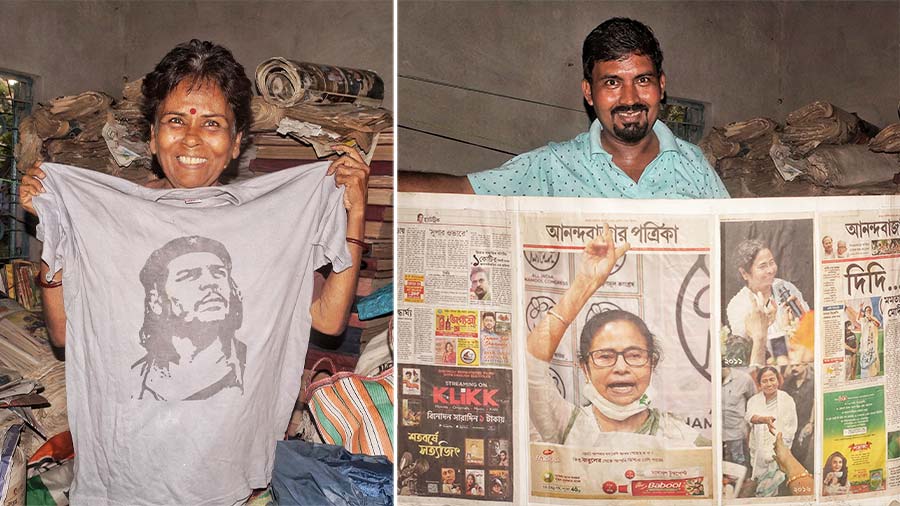
The Paul household is a politically charged space, with Dipika being a Che Guevera fan, and Dinanath being an ardent supporter of Mamata Banerjee. Dipika’s most prized possession is a (left) Guevera-themed vest procured at the Book Fair many years ago, while Dinanath has compiled Didi’s news stories since 1984
An incident Dinanath hasn’t forgotten dates back to the early 2000s when he was in his twenties. It happened outside the Greek Orthodox Church near the Kalighat tram depot. “I still remember arguing fiercely with a newspaper vendor for an edition that carried the news of Indira Gandhi’s death. I was trying to convince him to sell the [nearly 20-year-old] edition but he was unwilling to do so. Ultimately, I paid him Rs 2,500 for it.”
Dinanath would find many more hidden treasures, thanks to his former job as a security guard. “Residents of the building knew about my passion and gave me their old newspapers,” he says. Similarly, when he worked in a leather company in Bhowanipore, many of his colleagues knew about his passion and some, particularly seniors, handed over old newspapers they had at home. “One such generous soul ended up giving me a copy dating back to the World War II years,” he reminisces.
More valuable than a job
How hard is it to maintain his collection? Dinanath grimaces. “I source special ivory paper from Sealdah at a premium. A single bundle costs Rs 600, and I have over a hundred here. It is very hard without financial aid, and I don’t know how long I can manage,” he says, adding that it takes at least Rs 2,500 every month to sustain his passion. But he is far from giving up. A defining feature of Dinanath’s character is his determination to do things his way. A few years ago, the West Bengal government had asked him to donate his collection, offering in return a job wherever these newspapers would be archived. “I declined,” Dinanath says, “because even if I was looking after them, they wouldn’t be mine. Eita bikri korley amaar jibon shesh (If I sell my collection, my life would lose all meaning).”
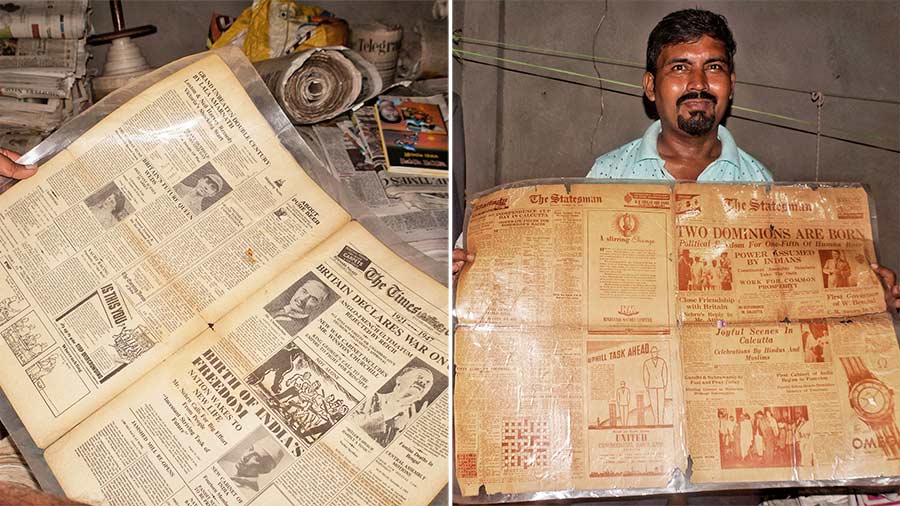
Some of Dinanath’s favourite issues are reports on (L-R) World War II and India’s Independence
A smile creases his face as he recalls an incident. It happened with a woman with whom he was considering marriage. “She asked me to get rid of all my newspapers since they wouldn’t help in feeding a family. I folded my hands and apologised.” He was polite but firm. “Eita hobe na (that’s not possible),” he told her.
Dinanath showed similar tenacity as a guest star at the quiz show Dadagiri where the host, former cricketer Sourav Ganguly, had offered to pass on to Tendulkar the scroll Dinanath had compiled on his idol. “If he showed my scroll to Sachin, I would get just an ordinary signature,” Dinanath says, explaining why he had refused the offer. If he has to pass on the scroll to Tendulkar, he would rather do it himself, in person. “Jodi aek garib manush nijey onake eita daye, taar mulyo khub boro (for an underprivileged fan there’s more satisfaction in personally gifting something to his hero than doing so through somebody else). Besides, what’s life without a dream?”
Dinanath’s ultimate dream is to compile his newspapers, which already number over a lakh, into a hundred books, based on genre and people. His collection already attracts research scholars from all over the city and he hopes to set up a separate archive room if he can find a sponsor. “In an age where news is going online, my life’s purpose is to show the beauty of newspapers,” he says. “Call this an addiction, but that’s the only one I have.”
If you wish to help Dinanath, you can reach out to him at +91 8017054372.
